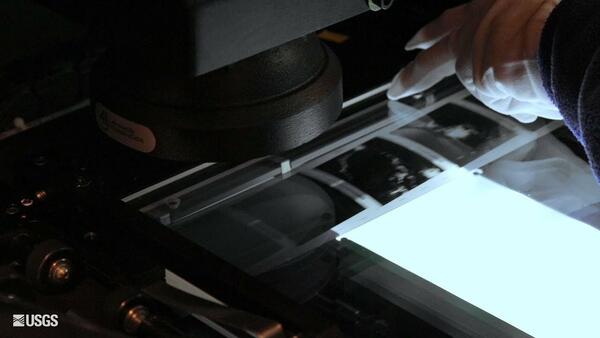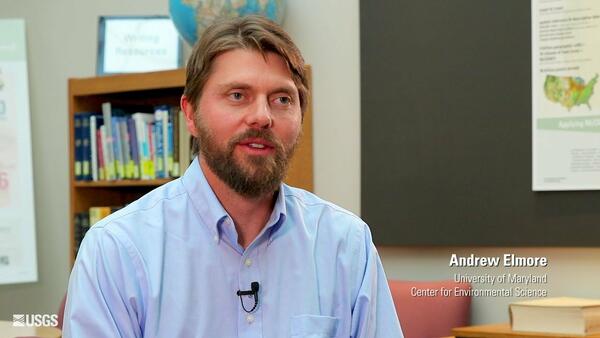Landsat in Action - Google's Earth Engine with Noel Gorelick
Landsat in Action - Google's Earth Engine with Noel GorelickGoogle's Noel Gorelick talks about the value of Landsat data in the Earth Engine project.

An official website of the United States government
Here's how you know
Official websites use .gov
A .gov website belongs to an official government organization in the United States.
Secure .gov websites use HTTPS
A lock () or https:// means you’ve safely connected to the .gov website. Share sensitive information only on official, secure websites.
Led by USGS and NASA Landsat Project Scientists, Landsat Science Teams consist of USGS and NASA scientists and engineers, external scientists, engineers, and application specialists, representing industry and university research initiatives. The Science Teams are tasked with providing scientific and technical evaluations to the USGS and NASA to ensure the continued success of the Landsat program.
The overall responsibility of the Landsat Science Team is to offer informed advice and recommendations to the USGS and other partners on topics that will affect the overall success of the Landsat missions.
The Team members must be knowledgeable on topics related to more effective use of archived data from Landsat sensors and on the requirements for future sensors needed to address the needs of scientists and other users of Landsat-type data.
Although the panel's role is advisory, Landsat Science Team members address many specific objectives:
The Landsat Science Team generally meets two times each year, or more frequently if issues arise that require additional direct dialog. During these meetings, Landsat Science Team members present their research that is relevant to the meeting topics, and are briefed by USGS and NASA staff on mission and program status. Landsat Science Team members are expected to broadly share results of their Landsat research and facilitate technical exchange with the Landsat user community. All presentation materials are available on the web soon after the completion of each meeting.
Landsat Science Team members are tasked to provide scientific and technical evaluations on topics that are deemed important across the Landsat user community, for example:
Data Characterization
Landsat Science Data Products
Data Applications
The success of Landsat missions are marked by the complete integration of newly acquired data with past and present remotely sensed data for the purpose of observing and monitoring global environmental systems. Specific Landsat Science Team measures of success include:
These measures provide direct benefits to the DOI, USGS, and NASA as they plan for and implement future missions, and continue to improve the relevance of all archived Landsat data.
 Landsat in Action - Google's Earth Engine with Noel Gorelick
Landsat in Action - Google's Earth Engine with Noel Gorelick
Google's Noel Gorelick talks about the value of Landsat data in the Earth Engine project.
Google's Noel Gorelick talks about the value of Landsat data in the Earth Engine project.
 Landsat in Action - The Importance of Landsat with Curtis Woodcock
Landsat in Action - The Importance of Landsat with Curtis Woodcock
Boston University Professor Curtis Woodcock talks about the significance Landsat was had in science and what he hopes to see as the mission continues.
Boston University Professor Curtis Woodcock talks about the significance Landsat was had in science and what he hopes to see as the mission continues.
 Landsat in Action - Forestry Research with Warren Cohen
Landsat in Action - Forestry Research with Warren Cohen
Warren Cohen with the USDA Forest Service talks about the value of Landsat's long history of observations in monitoring and assessing forests.
Warren Cohen with the USDA Forest Service talks about the value of Landsat's long history of observations in monitoring and assessing forests.
 Landsat in Action - Monitoring Crop Land with Martha Anderson
Landsat in Action - Monitoring Crop Land with Martha Anderson
Martha Anderson with the US Department of Agriculture talks about the value of Landsat and its thermal data in studying agricultural land.
Martha Anderson with the US Department of Agriculture talks about the value of Landsat and its thermal data in studying agricultural land.
 Landsat in Action - Minnesota Lakes with Leif Olmanson
Landsat in Action - Minnesota Lakes with Leif Olmanson
Leif Olmanson from the University of Minnesota talks about the value of Landsat data in monitoring the thousands of lakes in Minnesota.
Leif Olmanson from the University of Minnesota talks about the value of Landsat data in monitoring the thousands of lakes in Minnesota.
 Landsat in Action - Monitoring Canada's Forest with Mike Wulder
Landsat in Action - Monitoring Canada's Forest with Mike Wulder
Mike Wulder with Canada's Forest Service talks about the value Landsat images have for mapping and monitoring Canada's forested areas.
Mike Wulder with Canada's Forest Service talks about the value Landsat images have for mapping and monitoring Canada's forested areas.
 Landsat in Action - Tracking Water Changes with John Schott
Landsat in Action - Tracking Water Changes with John Schott
John Schott with the Rochester Institute of Technology discusses using Landsat Data over the years, and how its Thermal data tracks temperature changes in water bodies.
John Schott with the Rochester Institute of Technology discusses using Landsat Data over the years, and how its Thermal data tracks temperature changes in water bodies.
 Landsat in Action - Changing Forest Phenology with Andrew Elmore
Landsat in Action - Changing Forest Phenology with Andrew Elmore
When parking lots go up, when rooftops multiply, land cover and land uses change. Professor Andrew Elmore with the University of Maryland’s Center for Environmental Science understands that very well, and explains how he uses Landsat to study and quantify that change in USGS EROS’ latest “Landsat in Action” video conversation.
When parking lots go up, when rooftops multiply, land cover and land uses change. Professor Andrew Elmore with the University of Maryland’s Center for Environmental Science understands that very well, and explains how he uses Landsat to study and quantify that change in USGS EROS’ latest “Landsat in Action” video conversation.
 Landsat in Action — Open Data in Australia with Adam Lewis
Landsat in Action — Open Data in Australia with Adam Lewis
Geoscience Australia's Acting Chief Scientist Adam Lewis talks about the value of Landsat data, the importance of free and open policy, and how analysis ready data is advancing earth observing science.
Geoscience Australia's Acting Chief Scientist Adam Lewis talks about the value of Landsat data, the importance of free and open policy, and how analysis ready data is advancing earth observing science.
 Landsat In Action - Monitoring Polar Ice Caps with Ted Scambos
Landsat In Action - Monitoring Polar Ice Caps with Ted Scambos
Ted Scambos, Lead Scientist at the National Snow & Ice Data Center, talks about the roll of Landsat in his research studying polar regions.
Ted Scambos, Lead Scientist at the National Snow & Ice Data Center, talks about the roll of Landsat in his research studying polar regions.
 Landsat In Action - Assessing Global Impact with Alan Belward
Landsat In Action - Assessing Global Impact with Alan Belward
Alan Belward from the European Union's Joint Research Center discusses how Landsat helps his team promote sustainable development.
Alan Belward from the European Union's Joint Research Center discusses how Landsat helps his team promote sustainable development.
 Landsat in Action - Google's Earth Engine with Noel Gorelick
Landsat in Action - Google's Earth Engine with Noel Gorelick
Google's Noel Gorelick talks about the value of Landsat data in the Earth Engine project.
Google's Noel Gorelick talks about the value of Landsat data in the Earth Engine project.
 Landsat in Action - The Importance of Landsat with Curtis Woodcock
Landsat in Action - The Importance of Landsat with Curtis Woodcock
Boston University Professor Curtis Woodcock talks about the significance Landsat was had in science and what he hopes to see as the mission continues.
Boston University Professor Curtis Woodcock talks about the significance Landsat was had in science and what he hopes to see as the mission continues.
 Landsat in Action - Forestry Research with Warren Cohen
Landsat in Action - Forestry Research with Warren Cohen
Warren Cohen with the USDA Forest Service talks about the value of Landsat's long history of observations in monitoring and assessing forests.
Warren Cohen with the USDA Forest Service talks about the value of Landsat's long history of observations in monitoring and assessing forests.
 Landsat in Action - Monitoring Crop Land with Martha Anderson
Landsat in Action - Monitoring Crop Land with Martha Anderson
Martha Anderson with the US Department of Agriculture talks about the value of Landsat and its thermal data in studying agricultural land.
Martha Anderson with the US Department of Agriculture talks about the value of Landsat and its thermal data in studying agricultural land.
 Landsat in Action - Minnesota Lakes with Leif Olmanson
Landsat in Action - Minnesota Lakes with Leif Olmanson
Leif Olmanson from the University of Minnesota talks about the value of Landsat data in monitoring the thousands of lakes in Minnesota.
Leif Olmanson from the University of Minnesota talks about the value of Landsat data in monitoring the thousands of lakes in Minnesota.
 Landsat in Action - Monitoring Canada's Forest with Mike Wulder
Landsat in Action - Monitoring Canada's Forest with Mike Wulder
Mike Wulder with Canada's Forest Service talks about the value Landsat images have for mapping and monitoring Canada's forested areas.
Mike Wulder with Canada's Forest Service talks about the value Landsat images have for mapping and monitoring Canada's forested areas.
 Landsat in Action - Tracking Water Changes with John Schott
Landsat in Action - Tracking Water Changes with John Schott
John Schott with the Rochester Institute of Technology discusses using Landsat Data over the years, and how its Thermal data tracks temperature changes in water bodies.
John Schott with the Rochester Institute of Technology discusses using Landsat Data over the years, and how its Thermal data tracks temperature changes in water bodies.
 Landsat in Action - Changing Forest Phenology with Andrew Elmore
Landsat in Action - Changing Forest Phenology with Andrew Elmore
When parking lots go up, when rooftops multiply, land cover and land uses change. Professor Andrew Elmore with the University of Maryland’s Center for Environmental Science understands that very well, and explains how he uses Landsat to study and quantify that change in USGS EROS’ latest “Landsat in Action” video conversation.
When parking lots go up, when rooftops multiply, land cover and land uses change. Professor Andrew Elmore with the University of Maryland’s Center for Environmental Science understands that very well, and explains how he uses Landsat to study and quantify that change in USGS EROS’ latest “Landsat in Action” video conversation.
 Landsat in Action — Open Data in Australia with Adam Lewis
Landsat in Action — Open Data in Australia with Adam Lewis
Geoscience Australia's Acting Chief Scientist Adam Lewis talks about the value of Landsat data, the importance of free and open policy, and how analysis ready data is advancing earth observing science.
Geoscience Australia's Acting Chief Scientist Adam Lewis talks about the value of Landsat data, the importance of free and open policy, and how analysis ready data is advancing earth observing science.
 Landsat In Action - Monitoring Polar Ice Caps with Ted Scambos
Landsat In Action - Monitoring Polar Ice Caps with Ted Scambos
Ted Scambos, Lead Scientist at the National Snow & Ice Data Center, talks about the roll of Landsat in his research studying polar regions.
Ted Scambos, Lead Scientist at the National Snow & Ice Data Center, talks about the roll of Landsat in his research studying polar regions.
 Landsat In Action - Assessing Global Impact with Alan Belward
Landsat In Action - Assessing Global Impact with Alan Belward
Alan Belward from the European Union's Joint Research Center discusses how Landsat helps his team promote sustainable development.
Alan Belward from the European Union's Joint Research Center discusses how Landsat helps his team promote sustainable development.


